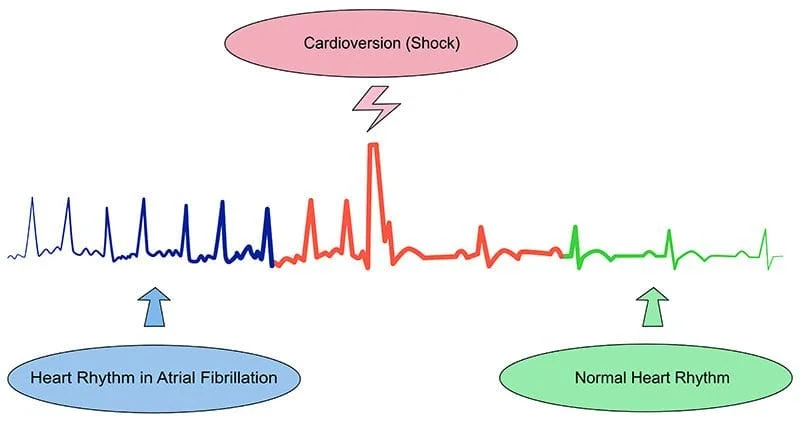Cardioversion Procedure in Houston, TX
- What is Cardioversion?
- Types of Cardioversion
- Electrical Cardioversion for Atrial Fibrilation (AFIB) or Atrial Flutter (AFL)
- How to Prepare for Cardioversion
- Risk of Stroke with Cardioversion
- Questions to Ask Your Doctor before Having Cardioversion
What Is Cardioversion?
Cardioversion is a medical procedure that can correct your arrhythmia by restoring your normal heart rhythm (sinus rhythm).
Cardioversion is commonly performed to correct atrial fibrillation (AFIB) and atrial flutter (AFL), but it can also be used to treat other arrhythmias, such as supraventricular tachycardia (SVT) or ventricular tachycardia (VT).
Types of Cardioversion
Chemical cardioversion: Your physician can use medications to correct your arrhythmia and restore your heart's regular rhythm (sinus rhythm). These medications are injected through your vein while you are being closely monitored in the hospital or the physician's office.
Electrical cardioversion: Also known as direct-current (DC) cardioversion, this procedure is performed to reset your heart's rhythm back to its regular pattern.
During this procedure, a high-voltage electric current (electrical shock) enters your heart through paddles placed on the chest wall. The electrical shock will cause a brief interruption of the abnormal heart rhythm and will reset the heart to sinus rhythm.
Physicians use sedative medications to make patients comfortable during the procedure. This procedure is performed in the hospital, where the medical staff can monitor the patients closely.
Electrical Cardioversion for Atrial Fibrillation (AFIB) or Atrial Flutter (AFL) in Houston, TX
Your doctor may recommend electrical cardioversion to correct your AFIB or AFL. If the procedure is successful, your heart rhythm will be restored to sinus rhythm. Some patients may need multiple electrical shocks to resume normal heart rhythm. Cardioversion offers a temporary solution to AFIB or AFL, but will not cure the arrhythmias permanently.
Your doctor may recommend additional treatments, such as medication or ablation, to reduce your chance of experiencing future episodes of arrhythmia after the cardioversion.
How to Prepare for Cardioversion
- After your procedure is scheduled, you will receive instructions on how to take your medications, how long to fast before the procedure, and other relevant information
- Arrange for someone to drive you to the hospital where your procedure is performed and take you home after the procedure
Risk of Stroke with Cardioversion
Patients with atrial fibrillation (AFIB) or atrial flutter (AFL) are at a high risk of developing blood clots in the heart. A small clot that forms in your heart can travel outside the heart during cardioversion. This clot can cause a blockage in a critical artery that supplies blood to the brain, leading to a stroke.
It is crucial to tell your doctor if you have not been taking your blood thinners (anticoagulants) regularly or are unable to take blood thinners for any reason.
The physician will ensure that you are taking blood thinners before and after the procedure, to lower the risk for stroke. Your doctor may also schedule an imaging test, called a transesophageal echocardiogram (TEE), right before the cardioversion, to ensure that there are no blood clots in your heart.
Transesophageal echocardiogram (TEE) is a type of heart ultrasound. To perform this test, the doctor will pass the ultrasound probe through your esophagus (the food pipe that connects your mouth to your stomach) and will use it to take pictures of your heart chambers, valves, and large arteries connected to your heart. TEE allows your doctor to look more closely at your heart and check for the presence of clots in your heart chambers.
TEE is usually performed on the same day, shortly before the cardioversion procedure. If the TEE shows that you have a clot in your heart, your doctor will not proceed with the cardioversion.
Questions to Ask Your Doctor before Having Cardioversion for Atrial Fibrillation (AFIB) or Atrial Flutter (AFL)
- How is the procedure performed?
- How can I prepare for the procedure?
- Do I need to have a transesophageal echocardiogram (TEE) before the procedure?
- Will I be asleep during the procedure? Is it painful?
- What are the risks of the procedure?
- How soon after cardioversion can I go back to work?
- Can I go home after the procedure?
- Can I drive myself after the procedure?
- Do I need to stop any of my medications before or after the cardioversion?
- Should I take my blood thinners (anticoagulants) before and after the procedure
- Will cardioversion cure my arrhythmia permanently?
- What is the chance of my arrhythmia returning after the procedure?
For Comprehensive Heart Disease Care Contact Dr. Alizera Nazeri
If you have ever experienced a fainting spell and you have heart disease or have known risk factors, call Dr. Alizera Nazeri at (713) 909-3166 to schedule an evaluation or Request an Appointment online. He sees patients in Houston, Texas.


